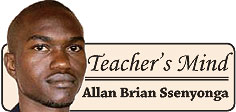Fear is the only impediment to learning. Fear is common when learning because as human beings, we are always concerned about how society perceives us and therefore some of us are afraid of going the extra mile.This is because learning implies the presence of ignorance. This ignorance is viewed with shame and few are ready to admit that they actually do not know everything.


Fear is the only impediment to learning. Fear is common when learning because as human beings, we are always concerned about how society perceives us and therefore some of us are afraid of going the extra mile.
This is because learning implies the presence of ignorance. This ignorance is viewed with shame and few are ready to admit that they actually do not know everything.
There are so many proverbs related to ignorance. One of my secondary school teachers often told us that the Chinese say, "If you ask you are a fool five minutes. If you do not ask you are a fool forever.”
In order for learning to occur, one must be ready to first acknowledge that they do not know but are willing to know and they proceed to seek knowledge by asking or reading.
There shouldn’t be any shame in asking. Any professional teacher will tell you that the most common phrase we utter in class is, "Please if you have not understood, ask.”
Of course there are several incidents where a student may ask questions while the rest of the class breaks into endless laughter. It may be because the question asked is silly or because the other students think the person asking the question is silly.
Either way, a professional teacher should be able to calm such a situation by simply saying, "That is a good question.” And then proceed to answer it.
Alternatively, you can ask the rest of the students to answer the ‘silly’ question. This works like magic since the discovery that some of those who laughed actually didn’t know the answer serves to reassure the student who asked that it is okay not to know.
Teachers have a duty to teach students the culture of asking if they want to learn more. This culture will only emerge if teachers too are approachable and open to discussion. A student should be able to feel free to ask their teacher any question even outside class time.
Additionally, teachers must be truthful to their students. Not knowing an answer to a question is not a crime, however assuring students that an answer will be found if given more time makes students trust teachers more as opposed to telling lies about something you have no clue about.
There is no point for teachers to position themselves as an encyclopaedia yet they are not.
Teachers should not just teach students to only ask but to also seek for information. For example, do your students know how to use a dictionary? One of my teachers always told us that a dictionary is not read but consulted. In other words it should be close enough for research.
This is the digital era where ICT is now part and parcel of the education system. Students must be taught to use search engines on the internet.
Google is definitely the most popular search engine and students should know how to make use of this source of information.
This process is technically referred to as Search Engine Optimisation. Sites like Wikipedia (often referred to as the web encyclopeadia) may have information that is not verified, therefore cross checking facts is wise for any student.
There is more to attending classes that passing exams. Some educationists have argued that educated people in this century are not those who have been to school but those who are able and ready to learn, unlearn and learn again.
Remember everyone is ignorant about something so there should be no fear or shame in learning something new.


